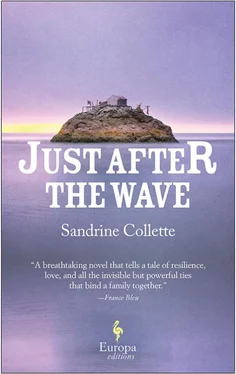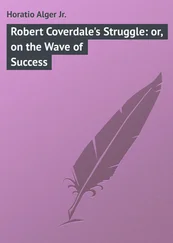But the children are laughing, and Sidonie is clapping her hands and saying, Daddy!, and only then does the father see Marion clinging to Liam’s legs. He tells himself he panicked a bit too soon, that nothing has happened at all, but with what life has been throwing at them he has an excuse, after all, at least that is what he thinks immediately afterwards, knuckles white, heart racing, he laughs too, for no reason, tries to steady his voice as he looks at them all:
“Is everyone all right?”
“Look!” exclaims Emily.
She picks Marion up in her arms and walks a few steps away. The baby kicks her legs, beaming, and lets out a delighted cry.
“Marion,” says Emily very seriously, “do you see Liam?”
She sets Marion on the ground, holding her with her fingertips.
“Do you see him?”
Liam crouches down and holds out his arms.
And Pata sees his littlest one, his last-born, let go of Emily’s hands, and so delicately balanced a single puff of air would blow her over, her eyes riveted on Liam’s as he encourages her, she takes tiny steps to reach for her brother’s fingers.
Sidonie bursts out laughing.
“She’s walking, she’s walking!”
Marion collapses against Liam, who picks her up and swings her around, singing, She’s a big girl, not a baby anymore —and the little girl giggles for all she’s worth, radiant, waving her arms to be let down on the ground to do it over again.
“So that’s why, so that’s why…” stammers Pata, still shaken with the fear he felt on coming home. “That’s all it was…”
Sidonie frowns.
“But it’s great!”
“Yes. Yes, of course…”
And in front of the squealing, chattering children, all focused on the baby who is no longer quite a baby, Pata slips to the ground, his hands in theirs, with tears on his cheeks because he wishes Madie were there with them, wishes she hadn’t missed Marion’s first steps and the children’s joy in the garden, so she could see that even if there are only six of them, they are still a family, if only she would try, if only she were here; yes. They kiss, cuddle, and tell each other stories, enjoying the soft air for a long while, running their hands through the tickly grass. Let’s have supper out here , suggests Pata, I’ll go get some ham and cheese, some sausages and fruit . Emily jumps up:
“I’ll come with you.”
By the time they return, Liam has gathered some branches and made a fire, despite the heat.
“We’ll be glad to have it once it gets dark, otherwise we’ll get cold.”
“And this way there won’t be any mosquitoes,” says Sidonie, pointing to her bare arms and going to huddle next to her father, on the other side of Emily, who is holding Marion.
They eat, and jabber away. Pata gave Liam a glass of wine, then another one, and now the eldest’s head is spinning and he’s laughing at everything. Emily and Sidonie beg to try, too, just a sip, that’s all, to see if it does the same to them; when the father gives in at last, they take a swallow and make a face, then burst out laughing a moment later.
“Me too, I feel the same as Liam!” says Sidonie, thrilled.
Liam knows that’s impossible, he looks at Pata with a shrug, if they’re enjoying it, and the father returns his laughing gaze— it’s fine . Emily snorts and looks at her sister; they both collapse in inexplicable, uncontrollable laughter, and Liam and Pata cannot resist it, either, even Marion, she doesn’t understand why but her clear laugh rises on the evening air, and as he catches his breath Pata listens to them, their high-pitched tones, their voices of babies of children of almost grown-ups, a disorderly joyful clamor, as if echoing a time so recent and so long ago when they were all together, all eleven of them, so some remnant of their strength and complicity is still alive, something lives on, Madie has to come back and see this and begin to live again, with them; that’s what he thinks.
* * *
During the few hours of daylight remaining, huddled in the boat, Madie roared at the water, insults and abuse and a promise to destroy the earth if it didn’t restore her children to her, she has torn at her face and her clothes, rent the air with her threats, but there’s nothing for it, nothing has been restored to her, not even a cry or a mutter.
Now Madie is on her knees but not praying: she is trying to go inside her shattered body. She wants to dissolve, so there will be nothing left to think, nothing to suffer from. To disappear, because all other solutions are illusory. For a few moments she gazes at the water around her and temptation slips by; it would be so easy to tip overboard. But she knows her reflexes and her instincts, and her capacity for struggle; she remembers those twelve days of suffering on the water, her hatred ripening, her fear and anxiety, and that is what keeps her back, in fact, fear—Madie does not want to die in the water.
But she does not want to go back to the place where she failed, either, crushed with shame, disappointment, defeat.
So she reaches her decision: she won’t go back.
She won’t go home.
She knows what this means: never to see them again. And what is even more certain at this moment: she does not have the strength to see them again. Her sorrow is proportional to her dashed hopes: immense. Madie is inconsolable. And the ocean doesn’t give a damn.
There is nothing inside her of a mother anymore, she is like a little fish that the current is rolling endlessly toward the shore, and which has given up on the open ocean, allowing itself to beach on the sand where the lack of water will seal its fate, and it listens to its breathing getting weaker, then stopping, a few instants, one two three, its belly rises and falls a bit more, one two, mouth open, one, nothing moving, zero. She, too, will stop living. On this boat out of gas. Madie throws the last of her supplies overboard. She knows the temptation will be too great, once thirst begins to dry her lips and hunger turns her stomach inside out, she will no longer have the will; so she makes the first move, she takes out the bag with the food, the bottles of water, hesitates. But this is what she wants. She clenches her teeth. In a single gesture she flings it all over the side, as far as possible. She hears the sound it makes as it falls into the water, the sound of life slipping away. She thinks: that’s it.
She is there in silence.
The moon illuminates her gestures.
Once the sea has swallowed the bread, the cheese, the dried ham, and the bottles, which she uncorked, when the last dish towel has stopped floating at last and darkness has erased every trace, Madie breathes slowly. There are no more solutions, no more alternatives.
She pulls up the anchor, yes, in the middle of the night.
The boat hesitates, rocks back and forth, sways. Gradually a current bears it away, very slowly, imperceptibly. If Madie were standing on the chimney of her drowned house, she would notice that the boat is drifting, whispering, surely going away; but she is lying on the floorboards, and she can’t see anything other than the sides of the boat around her and the sky pricked with stars. Eyes wide open she stares at the darkness and the millions of flickering lights.
She knows she won’t get up again; this is her final battle.
Madie dozes, wakes, falls asleep again. Whether from exhaustion or emotion, her pain feels as if anesthetized, folded over on one side, buried. She has forgotten that she doesn’t want to go home because she has failed; she has forgotten hope, shame, collapse.
She has forgotten that she has a family.
Madie is alone on earth in a boat on the ocean; all that is left of her is a scrawny body empty of all will, of the memory of the children she had, living or dead.
Читать дальше












